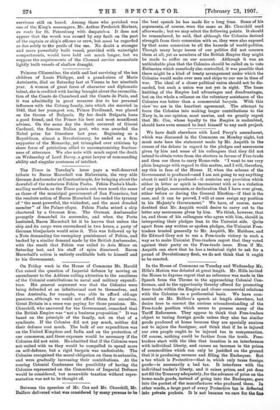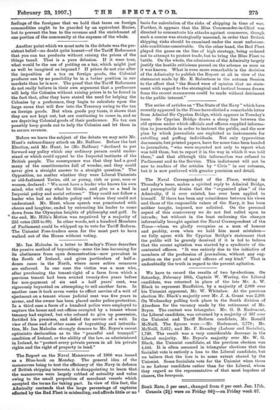In the House of Commons on Tuesday and Wednesday Mr.
Hills's Motion was debated at great length. Mr. Hills invited the House to express regret that no reference was made in the Speech from the Throne to the approaching Colonial Con- ference, and to the opportunity thereby offered for promoting freer trade within the Empire and closer commercial relations with the Colonies on a preferential basis. We have com- mented on Mr. Balfour's speech at length elsewhere, but desire here to correct the curious misunderstanding of the Free-trade position which seems to possess many of the Tariff Reformers. They appear to think that Free-traders object to taxing foreign goods unless they also tax similar goods produced at home because they are specially anxious not to injure the foreigner, and think that if he is injured our own people ought to be injured too in compensation. Of course, nothing could be further from the truth. Free- traders start with the idea that taxation is an interference with individual liberty, and causes an increase in the prices of commodities which can only be justified on the ground that it is producing revenue and filling' the Exchequer. But a tax which is Protective—that is, whioh only taxes foreign goods—is necessarily a had tax. It interferes with the individual trader's liberty, and it raises prices, and yet does not fill the Treasury adequately, for the advance of price on the home-made goods, instead of going into the Exchequer, goes into the pocket of the manufacturer who produced them. In other words, a large part of every Protective tax is deflected into private pockets. It Is not because we care for the fin) feelings of the foreigner that we hold that taxes on foreign commodities ought to be guarded by an equivalent Excise, but to prevent the loss to the revenue and the enrichment of one portion of the community at the expense of the whole.











































 Previous page
Previous page